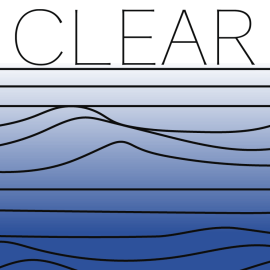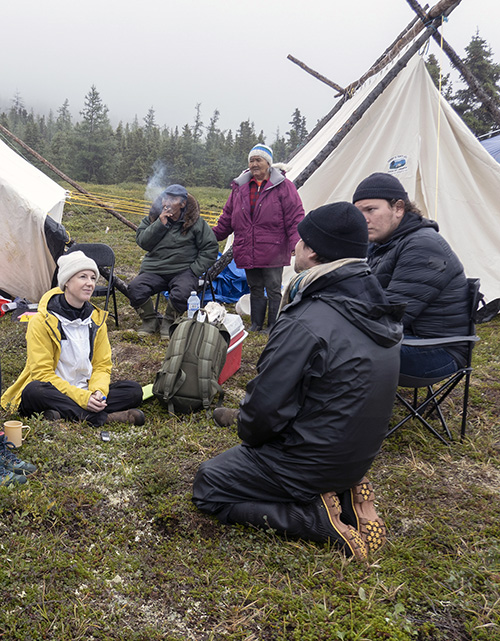
In the late summer of 2022, thirty-two people came together on the land at Sandy Point (near Nain), Nunatsiavut, to talk about research. This group included twenty-four people from Nain and eight from outside the region.
We talked about research methods and processes, sat in Labrador tents eating char and scallops, visited an archaeological dig site, picked berries, reflected on what it means to do respectful research, tried our hands at aging a seal using a tooth, and laughed and joked together.
This report, Nain On-The-Land Workshop: What We Said, documents our conversations about doing research in Nunatsiavut and includes an evaluation of the On-the-Land Workshop format. The report is co-authored by all participants.
“[I] want to find a settlement in Ramah with Lena and they will do some surveys in Ramah, the Nachvak area. That’s the only thing that [I] really want to say. [I] was born in Ramah in 1957 and from Ramah, relocated to Hebron and when Hebron was closed [I] moved to Makkovik but that’s not a common Hebron tradition. [I] learned quite a lot from this workshop here, but what [I liked] most today was the scallops and smoked char, that’s the only comment [I have] to say right now. It’s been a two-day learning experience. It was so good to meet other, different researchers here while on the land there’s still a lot more work to be done along the Labrador coast in order for Inuit to better understand Nain and the vicinities around it so it was really enjoyable and I’m so glad I was invited to this workshop. Thank you. We [Annie and Wilson] also want to thank the staff here and the researchers and to give my thanks too to the bear guard and our cook for doing a fabulous job. It was an enjoyable two days.”
Elder Annie Lidd, Final day comment
Cite As: Pijogge, Liz; Onalik, Joseph; Flynn, Mel; Jarause, Wilson; Lidd, Annie; Angnatok, Ethan; Jararuse, Josephine; Semigak, Lawrence; Lidd, Sukattai; Semigak, Tyriekah; Merkuratsuk, Siegfried; Semigak, Susie; Lyall, Susie Debbie; Semigak Lidd, Sarah; Pilgrim, Lauren; Semigak, Chesley; Lyall, Darrel; Haye, Emma; Onalik, Lena; Pamak, Carla; Saunders, Michelle; Merkuratsuk, Joseph; Merkuratsuk, Jenny; Angnatok, Pauline; Ikkusek, William; Michelin, Wilson; Maggo, Richard; Solomon, Shawn; Kohlmeister, Simon; Dwyer-Samuel, Frederic; Ortenzi, Kate; Gleason, Amber; Anderson, Matthew; Houde, Magali; Martinez-Levasseur, Laura; Barbel, Heloig; McCarney, Paul; Bond, Alex; Liboiron, Max. (2024). Nain On The-Land Workshop 2022: What We Said. Nunatsiavut Government; Civic Laboratory for Environmental Action Research (CLEAR), Memorial University; Natural History Museum.
The authorship order was based on an authorship meeting with workshop participants in Nain in December 2023 to discuss how to attribute everyone’s contributions. At this meeting, participants agreed that it is important to recognize the collective nature of the knowledge shared at the workshop by including everyone as an author.
Summary of Values for Respectful Research in Nunatsiavut
One of the core topics of discussion was around what respectful research in Nunatsiavut requires. The core themes included:
Community Connections: Building connections between local communities and external researchers should happen throughout the research process. Ideally, those connections will be in person to ensure clear communication, results sharing, and meaningful discussions.
Often we [researchers] just come in at the end and tell the results. But that’s not really working with communities, that’s just parachuting in and shouting […] So trying to start that relationship as early on as possible and work together, thinking about the study and constantly sharing tidbits here and there is just as important as doing a great big presentation in the community hall, and is a way that you get more people engaged early on because if you’re just coming in at the end, that’s almost too late, because there’s no chance for meaningful input.
Alex Bond
Collaborations: Better collaboration would improve research methods, but we need to address research sovereignty and equitable inclusion in research.
I would like to see more researchers train community members to be able to do the work and get paid the same amount as a grad student because they’re doing the same work that a grad student may be doing, but they’re not getting paid the same amount. I would like to see that the knowledge and the experience that we are bringing to the table [are] just as equally important as the knowledge that the scientists or the researchers bring to the table.
Carla Pamak
Open-Mindedness: Being open-minded means remembering that everyone has a role in making knowledge and meaning, including youth and the animals involved in the research.
When a youth is involved in something important or say a youth is given a voice […] they say, oh, good job. You’re doing so good. That’s so good. Good for you. You’re doing so well. And they praise you for it. But then they don’t give you an opportunity to actually have your voice mean something.
Joseph Onalik
Trust: We should build trust through respectful work that follows Nunatsiavut’s research protocols around results sharing and research sovereignty. Trust often relies on making personal connections.
We’re in the early stages of building our cabin during the winter and I was going down to do some work on the cabin and helicopters flying over the path I was taking, and I see them hanging out the chopper darting caribou to put them to sleep to take samples. Never, ever heard anything back of those fur samples, blood samples. Never heard a word.
Darrel Lyall
Research Connections: Building connections to the land where research happens can improve research quality. We should work to link research topics and projects to learn from and with each other and avoid duplicating work.
So the [Nunatsiavut] Research Centre, we try to make everything all come together and we’re not trying to duplicate research.
Michelle Saunders
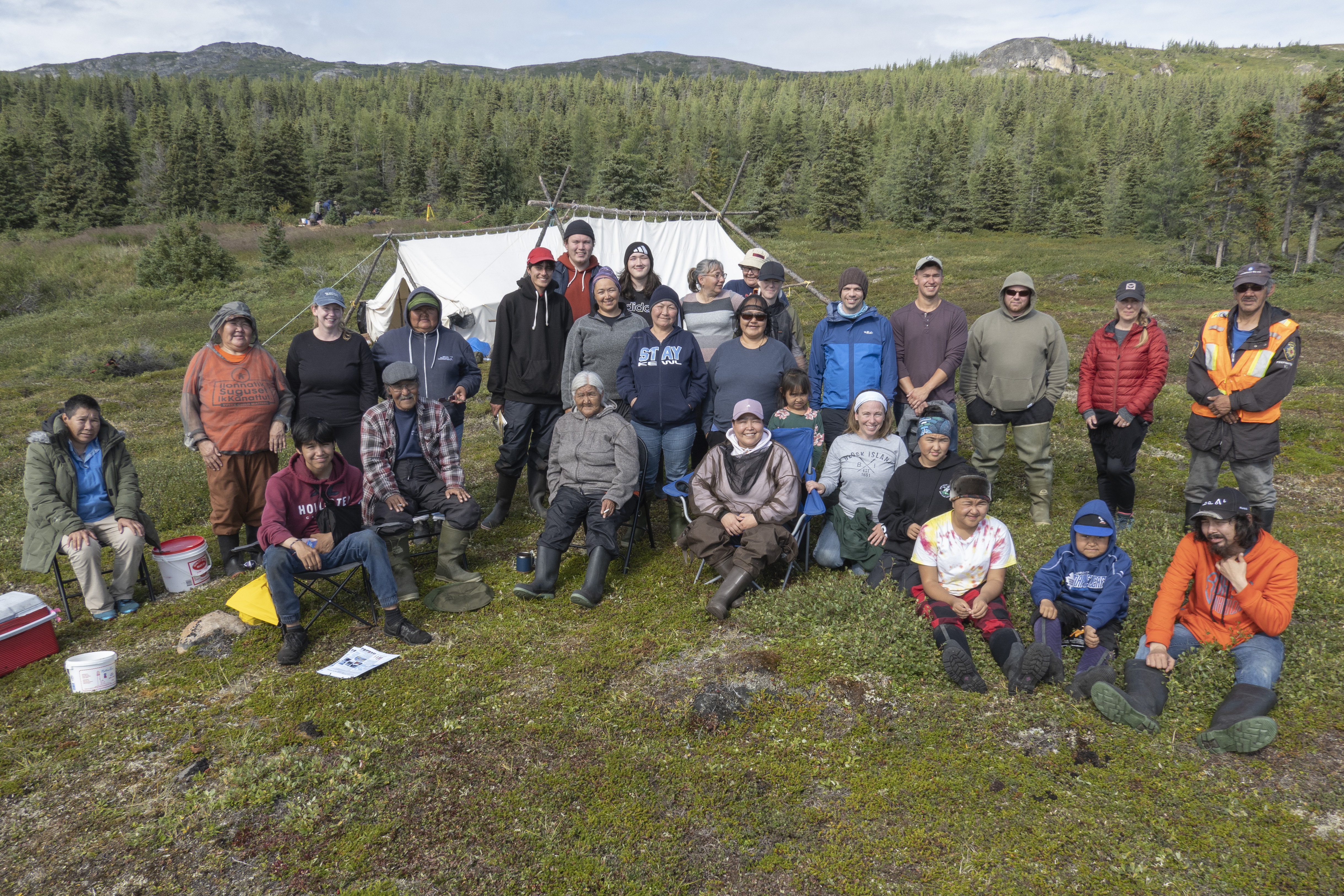
Photo the workshop participants. Featuring (left to right): Emma Haye, Jenny Merkuratsuk, Siegfried Merkuratsuk, Amber Gleason, Wilson Jararuse (sitting), Liz Pijogge, Heloig Barbel, Ethan Angnatok, Annie Lidd (sitting), Lena Onalik, Joseph Onalik, Susie Semigak, Carla Pamak, Pauline Angnatok, Sarah Semigak Lidd, Susie Debbie Lyall (sitting), Mel Flynn, Sukattai Lidd, Alex Bond, Kate Ortenzi, Matthew Anderson, Tyriekah Semigak, Josephine Jararuse, Darrel Lyall, Lawrence Semigak, Magali Houde, Buddy Merkuratsuk, Chesley Semigak. Taken on September 1, 2022. Photographer: Laura M. Martinez-Levasseur. Photo shared with consent from all pictured.
Summary of the Successes and Challenges of creating On-the-Land Workshops
Co-Learning: Participants shared thoughts about the workshop as a space for co-learning, emphasizing that keys to success were having different ways of knowing, holistic thinking, focusing on topics specific to the local context, having a mix of formal and informal formats, and finding a common language to discuss ideas.
Relationship Building: The evaluation data also highlighted successes in building relationships and making connections during the workshop.
Right Set Up: The logistics and organization of the On-the-Land workshop were critical to its success. In particular, participants appreciated having lots of time for relationship building, the location itself, and the food.
Administration: Although each workshop is different, it would be helpful to create some checklists and protocols for things that need to happen during the workshop organization.
Communication: The workshop evaluation brought up considerations about how to balance formal and informal communication methods when discussing research and how to maintain reciprocity.
Diverse Inclusion: We want to add more cultural aspects to workshops, with more space for community members to share their knowledge and experiences.

Report Launch
On April 3, 2024, we held a report launch at the Nigivik Centre in Nain. Fifteen people attended as we read the report together, told stories, at ate stacks.
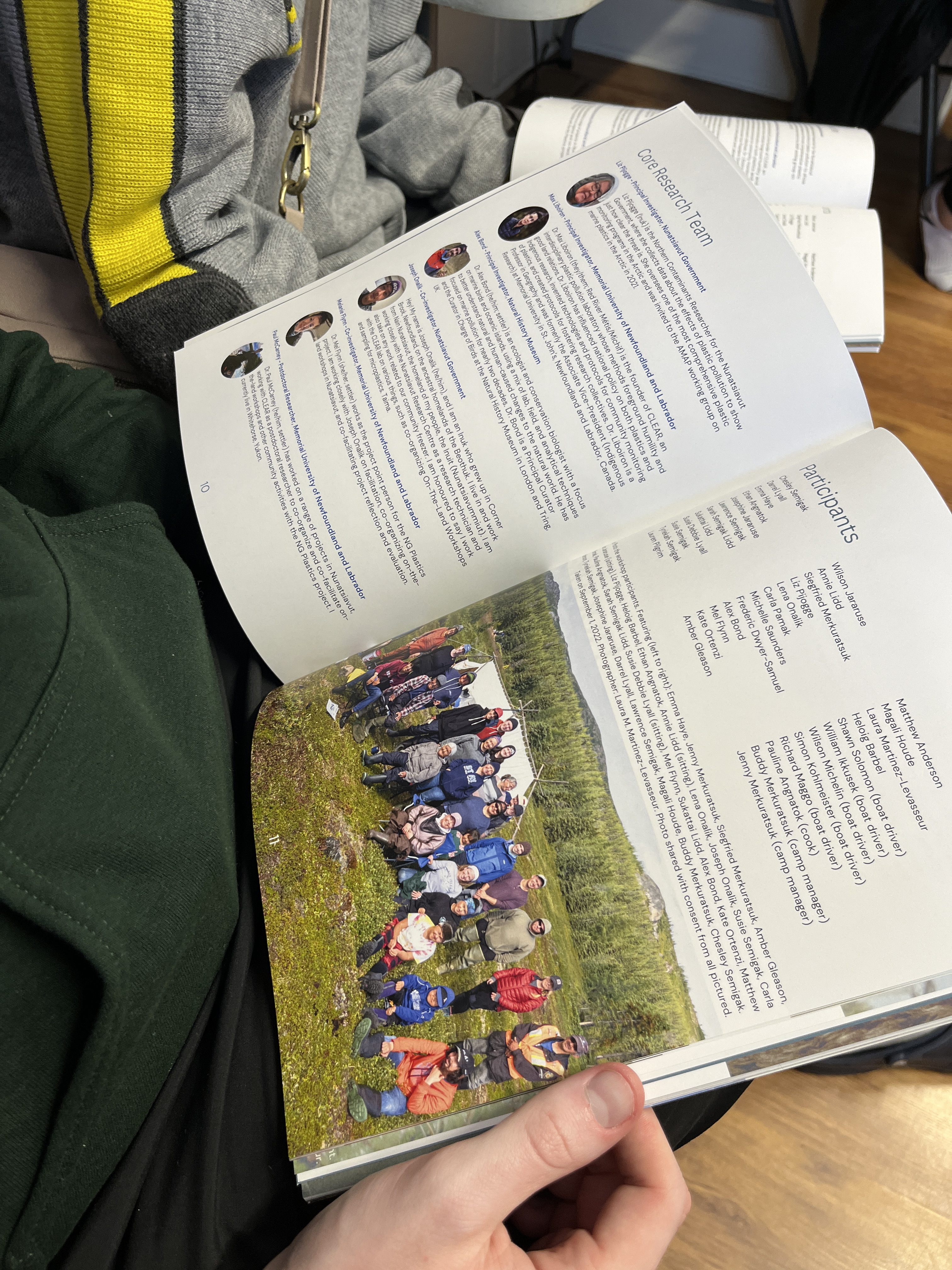
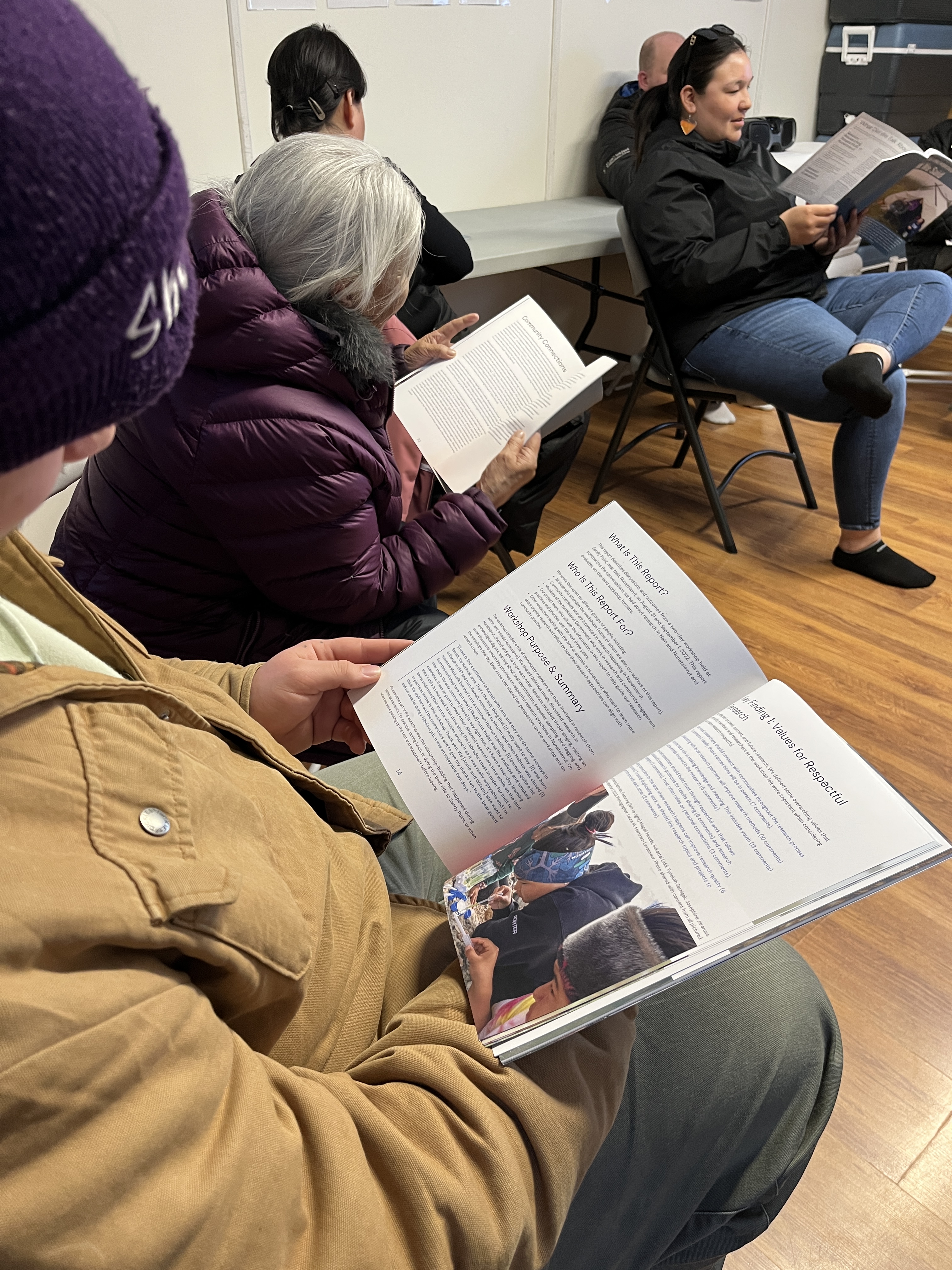
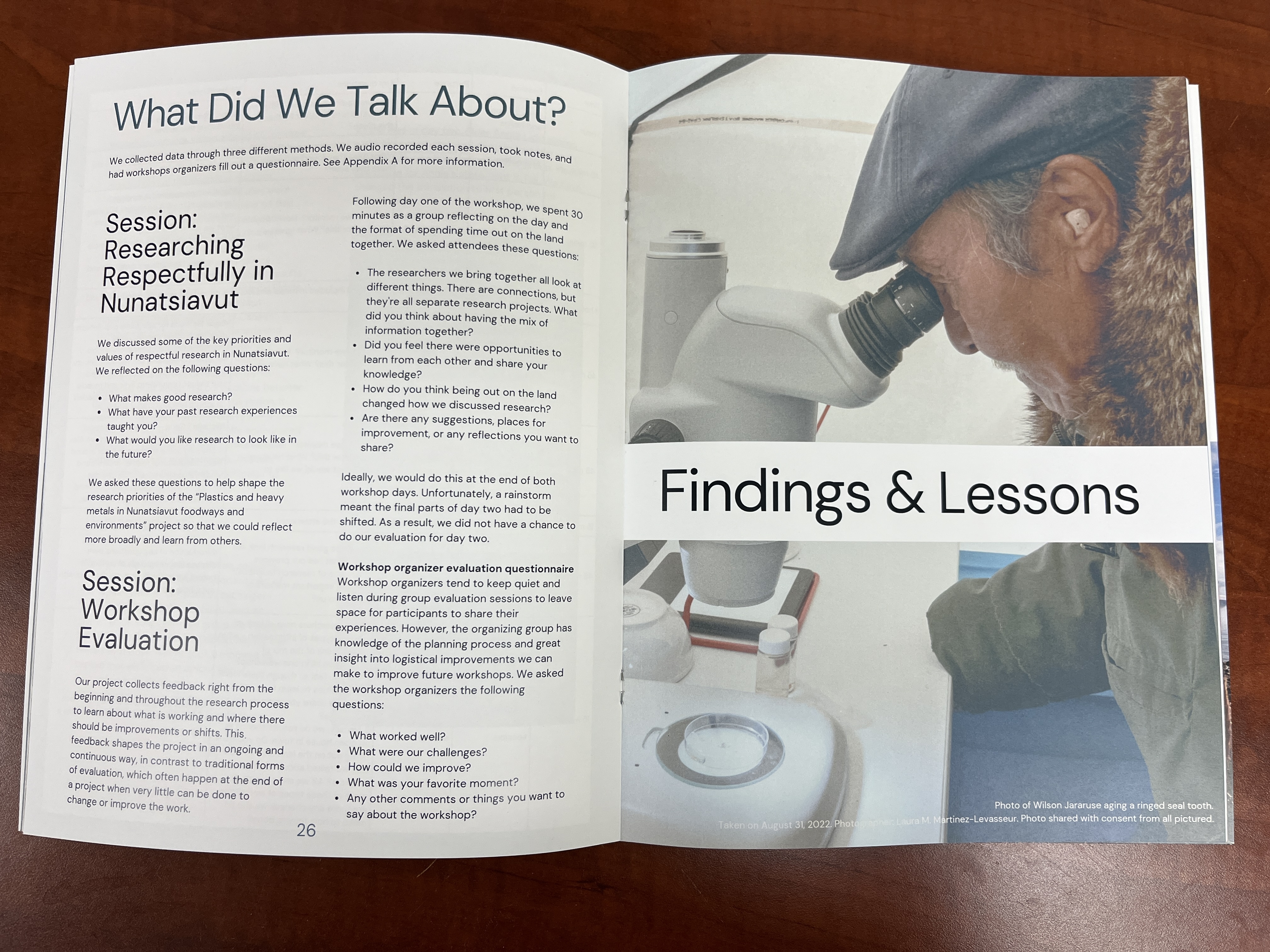
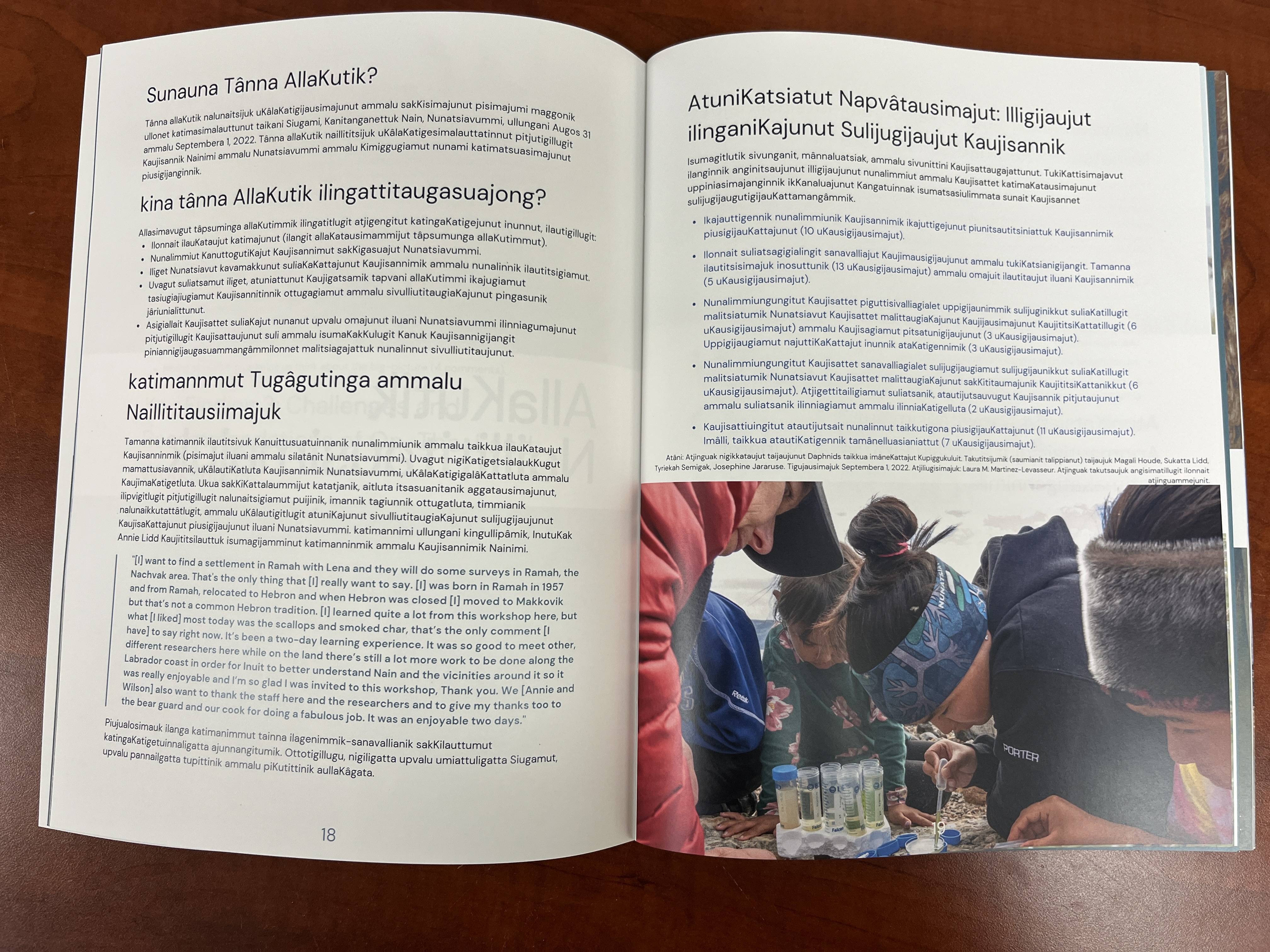
Contact
If you would like a paper copy of the report and are in Nain, contact Liz Pijogge at the Nunatsiavut Research Centre.
If you would like a paper copy of the report and are outside of Nain or would like a high-resolution digital copy, contact Max Liboiron at Memorial University.
